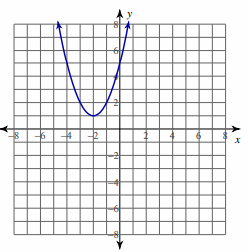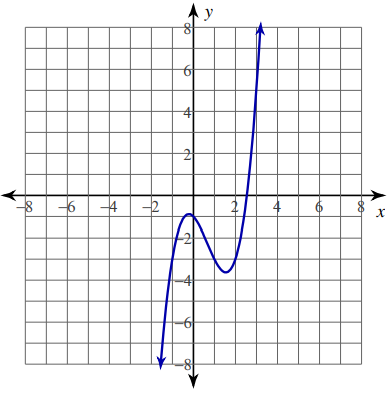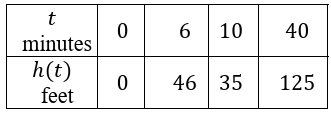Practice Problems Using Rolles Theorem and Mean Value Theorem
Subscribe to our ▶️ YouTube channel 🔴 for the latest videos, updates, and tips.
Explain why Rolle’s theorem is not applicable to the following functions in the respective intervals.
Problem 1 :
f(x) = |(1/x)|, x ∊ [-1, 1] Solution
Problem 2 :
f (x) = tan x, x ∊ [0, π] Solution
Problem 3 :
f(x) = x - 2 log x, x ∊ [2, 7] Solution
For each problem, determine if the Rolle's Theorem can be applied. If it can, find all values of c that satisfy the theorem. If it cannot, explain why not
Problem 4 :
y = (-x2 + 1)/3x [1, 6]
Problem 5 :
y = (x2 - x - 12)/(x + 4) [-3, 4]
Problem 6 :
y = (-x2 - 2x + 8)/(-x + 3); [-4, 2]
Answer Key
(1) f(0) = ∞
(2) f(π/2) = ∞
(3) f(2) ≠ f(7)
(4) f(1) = 0 and f(6) = -35/8
Since the condition is not satisfied, rolle's theorem does not exists.
5) the values of c are -4 + 2√2 and -4 - 2√2.
6) the values of c are 3 + √7 and 3 - √7.
Using the Rolle’s theorem, determine the values of x at which the tangent is parallel to the x -axis for the following functions :
Problem 1 :
f(x) = x2 − x, x ∈ [0, 1]
Problem 2 :
f(x) = (x2 - 2x)/(x + 2), x ∈ [-1, 6]
Problem 3 :
f(x) = √x - (x/3), x ∈ [0, 9]
For each problem, find the values of c that satisfy Rolle's Theorem.
Problem 4 :
y = x2 + 4x + 5; [−3, −1]

Problem 5 :
y = x3 - 2 x2 - x - 1; [−1, 2]

Problem 6 :
y = -2 sin (2x) [−π, π]
Problem 7 :
y = cos (2x) [π/3, 2π/3]
Answer Key
1) c = 1/2
2) the solutions are -2±2√2.
3) x = 9/4 ∈ [-1, 6]
4) the value of c is -2.
5) the required values of c are (2 + √7)/3 and (2 - √7)/3.
6) x = -π/4, -3π/4, π/4, 3π/4
7) the value of c is π/2.
Problem 1 :
Explain why Lagrange’s mean value theorem is not applicable to the following functions in the respective intervals :
(i) f(x) = (x+1)/x, x ∊ [-1, 2] Solution
(ii) f(x) = |3x+1|, x ∊ [-1, 3] Solution
Problem 2 :
Using the Lagrange’s mean value theorem determine the values of x at which the tangent is parallel to the secant line at the end points of the given interval:
(i) f (x) = x3 - 3x + 2, x ∊ [-2, 2] Solution
(ii) f(x) = (x-2)(x-7), x ∊ [3, 11] Solution
Problem 3 :
Show that the value in the conclusion of the mean value theorem for
(i) f (x) = 1/x
on a closed interval of positive numbers [a, b] is √ab
(ii) f (x) = Ax2 + Bx + C on any interval [a, b] is (a + b)/2
Problem 4 :
Determine whether
f(x) = cos x - sin x
satisfies the MVT on the interval [π/4, 5π/4] if it does, find all numbers c in (π/4, 5π/4) such that f'(c) = f(b) - f(a) / (b - a)
Decide whether mean value theorem applies. If it applies, find the value of x that satisfy the theorem.
Problem 5 :
f(x) = (x + 3) / (x - 3); [-1, 4]
Problem 6 :
f(x) = (1/3)x3 + (1/3)x - 4/3; [-1, 2]
Answer Key
1) i) The function is not continuous on the interval [-1, 2].
ii) it is not differentiable at x = -1/3
2) i) x = ±2/√3
ii) x = 7∊ [3, 11]
3) i) x = √ab
ii) x = (a+b)/2
4) the required value of c is 3π/4.
5) the required value of c lies in the given interval is 1.
Problem 1 :
A race car driver is racing at 20th km. If his speed never exceeds 150 km/hr, what is the maximum distance he can cover in the next two hours.
Problem 2 :
Suppose that for a function f (x),
f'(x) ≤ 1 for all 1 ≤ x ≤ 4. Show that f(4) − f(1) ≤ 3 .
Problem 3 :
Does there exist a differentiable function f(x) such that f(0) = −1, f(2) = 4 and f'(x) ≤ 2 for all x . Justify your answer.
Problem 4 :
Show that there lies a point on the curve
f(x) = x(x+3)eπ/2, -3 ≤ x ≤ 0,
where the tangent is parallel to the x-axis.
Problem 5 :
Using mean value theorem prove that for a > 0, b > 0,
|e-a-e-b| < |a-b|
Problem 6 :
Skater Sully is riding a skateboard back and forth on a street that runs north/south. The twice differentiable function S model's Sully's position on a street, measured by how many meters north he is from his starting point at time t, measured in seconds from the start of his ride. The table below gives values of S(t) at selected times t.

a) For 0 ≤ t ≤ 20must be there a time when Sully is 2 meters south of his starting point ? Justify your answer.
a) For 30 ≤ t ≤ 60 must be there a time t when Sully velocity 1.1 meters per pound is 2 meters south of his starting point ? Justify your answer.
Problem 6 :
A particle is moving along the 𝑥-axis. The twice-differentiable function 𝑠 models the particles distance from the origin, measured in centimeters, at time 𝑡, measured in seconds.

a. For 20 ≤ 𝑡 ≤ 25, must there be a time 𝑡 when the particle is at the origin? Justify your answer.
b. For 3 ≤ 𝑡 ≤ 10, must there be a time 𝑡 when the particle’s velocity is 1 cm per second? Justify your answer.
Problem 7 :
A hot air balloon is launched into the air with a human pilot. The twice-differentiable function ℎ models the balloon’s height, measured in feet, at time 𝑡, measured in minutes. The table below gives values of ℎ𝑡 at selected times 𝑡.

a) For 6 ≤ 𝑡 ≤ 10, must there be a time 𝑡 when the balloon is 50 feet in the air? Justify your answer.
b) For 10 𝑡 40, must there be a time 𝑡 when the balloon’s velocity is 3 feet per second? Justify your answer.
Answer Key
1) he can cover the maximum distance of 320 km/hr.
2) [f(4)-f(1)] ≤ 3
3) f'(x) = 2.5, it is not possible, because it is not in the interval [0, 2].
4) x = -3/2, ∊ [-3, 0]
5) |[e-b - e-a]| ≤ |b-a|
6) a) According to the IVT, there is a value 𝒄 such that 𝑺(𝒄) = -𝟐 and 𝟎 ≤ 𝒄 ≤ 𝟐0.
b) s'(c) = 1.1
7) a) According to the mean value theorem is a value c such that s(c) = 0 and 20 ≤ 𝑡 ≤ 25
b) s('c) = -1
8) a) No, the IVT does not guarantee a height of 50
b) es. According to the MVT, there must be a value 𝒄 where 𝟏𝟎 ≤ 𝒄 ≤ 𝟒𝟎 and 𝒉'(𝒄) = 𝟑

Subscribe to our ▶️ YouTube channel 🔴 for the latest videos, updates, and tips.
Kindly mail your feedback to v4formath@gmail.com
We always appreciate your feedback.
About Us | Contact Us | Privacy Policy
©All rights reserved. onlinemath4all.com

Recent Articles
-
SAT Math Problems on Exponents and Radicals
Feb 21, 26 08:28 PM
SAT Math Problems on Exponents and Radicals -
SAT Math Problems on Angles
Feb 21, 26 08:20 PM
SAT Math Problems on Angles -
Digital SAT Math Problems and Solutions (Part - 9)
Feb 21, 26 10:41 AM
Digital SAT Math Problems and Solutions (Part - 9)

